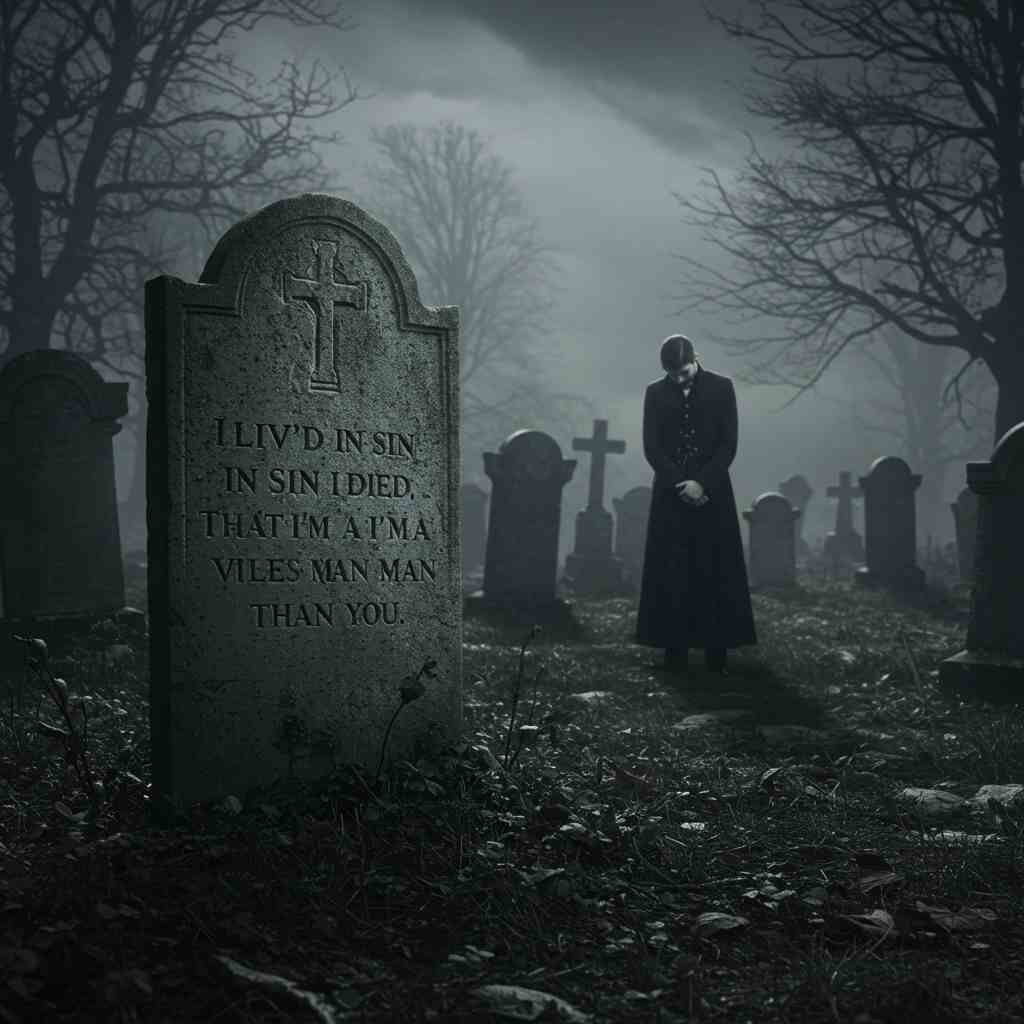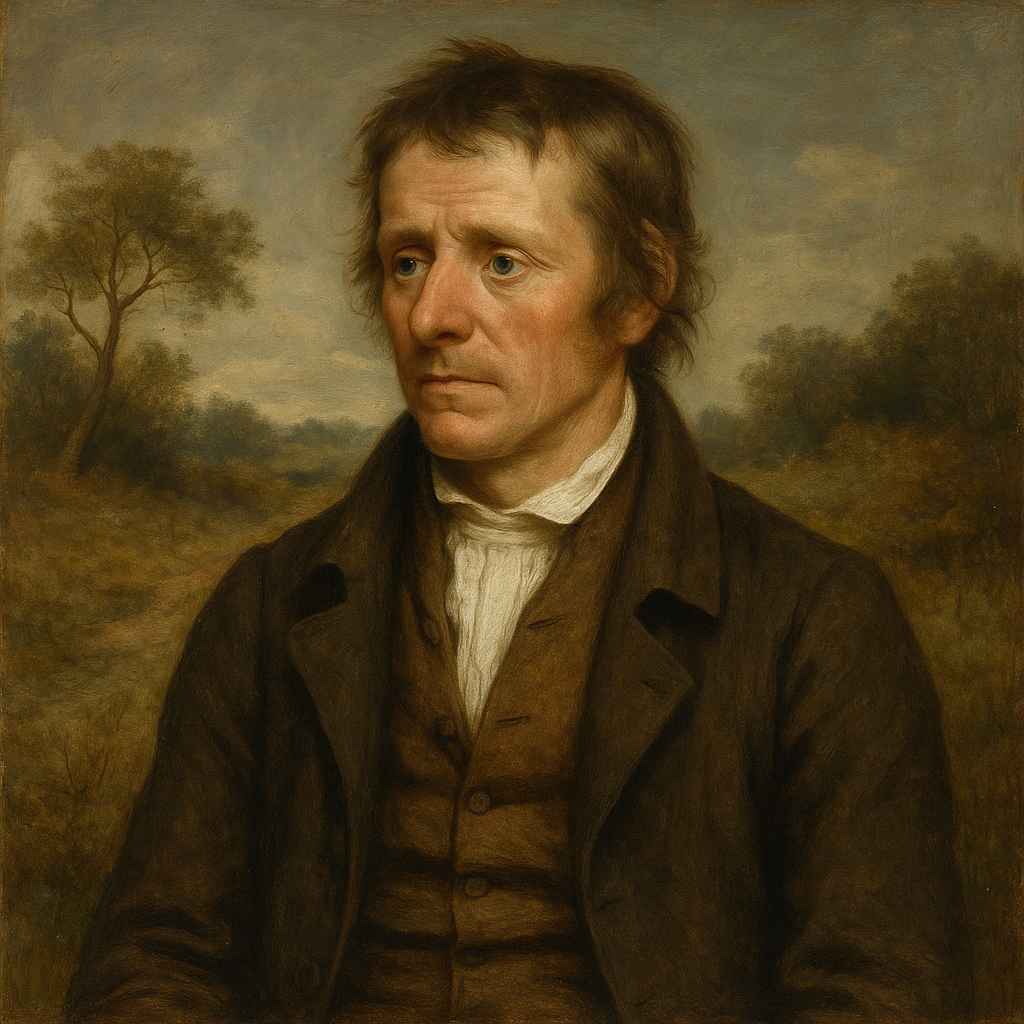The Universal Epitaph
John Clare
1793 to 1864

No flattering praises daub my stone,
My frailties and my faults to hide;
My faults and failings all are known—
I liv’d in sin—in sin I died.
And oh! condemn me not, I pray,
You who my sad confession view;
But ask your soul, if it can say,
That I’m a viler man than you.
John Clare's The Universal Epitaph
John Clare’s The Universal Epitaph is a striking meditation on human frailty, moral accountability, and the universality of sin. Composed in the early 19th century, the poem reflects Clare’s preoccupation with themes of guilt, redemption, and the human condition, while also engaging with broader Romantic-era concerns about individualism and spiritual introspection. Though brief, the poem is dense with emotional and philosophical weight, inviting readers to confront their own moral failings rather than passing judgment on others. Through its direct language, confessional tone, and theological undertones, The Universal Epitaph transcends its era, speaking to timeless questions of sin, forgiveness, and human equality before death.
Historical and Biographical Context
To fully appreciate The Universal Epitaph, one must consider both the historical milieu of early 19th-century England and Clare’s personal struggles. Born in 1793 into rural poverty, Clare was a laborer-poet whose work often grappled with themes of alienation, mental anguish, and societal neglect. His later years were marked by institutionalization for mental illness, and his poetry frequently oscillated between despair and a deep, if troubled, spiritual awareness.
The poem’s preoccupation with sin and confession aligns with the religious sensibilities of the time, particularly the influence of Evangelical Christianity, which emphasized personal repentance and the innate sinfulness of humanity. Clare’s own relationship with religion was complex; while he was not conventionally devout, his poetry often engaged with biblical themes, particularly the inevitability of death and the moral reckoning that accompanies it. The Universal Epitaph can thus be read as both a personal lament and a broader critique of hypocrisy—a reminder that all humans are flawed and that judgment is ultimately futile.
Literary Devices and Structure
Despite its brevity, The Universal Epitaph employs several key literary devices that amplify its emotional and philosophical resonance. The poem’s structure is tight and deliberate, with each line contributing to a cumulative effect of stark honesty and moral challenge.
1. Direct Address and Confessional Tone
The poem opens with an immediate rejection of posthumous flattery: “No flattering praises daub my stone.” This line establishes the speaker’s refusal to be memorialized falsely, rejecting the conventional epitaph that might gloss over human imperfections. The use of “daub” suggests an almost painterly deception, as if words on a tombstone could obscure the truth of a life lived in sin.
The second stanza shifts to a plea—“condemn me not, I pray”—directly engaging the reader in a moment of moral confrontation. This rhetorical strategy forces introspection, as the speaker challenges the living to examine their own souls before casting judgment. The confessional tone here is reminiscent of Augustinian or Puritan spiritual autobiographies, where self-scrutiny was paramount.
2. Parallelism and Repetition
Clare employs parallelism to reinforce the inevitability of sin and death:
-
“I liv’d in sin—in sin I died.”
-
“My faults and failings all are known—”
The repetition of “sin” and the mirrored structure of the lines create a sense of inescapability, emphasizing that moral failing is an intrinsic part of human existence. The dash in “in sin I died” also suggests a breathless finality, as if the speaker’s life and death are bound together in an unbroken chain of imperfection.
3. Rhetorical Challenge
The final two lines deliver the poem’s most piercing moment:
“But ask your soul, if it can say,
That I’m a viler man than you.”
Here, Clare universalizes the speaker’s condition, transforming a personal epitaph into a collective indictment. The rhetorical question does not seek an answer but rather forces the reader into uncomfortable self-reflection. The word “viler” is particularly loaded, implying not just difference in degree but a shared moral failing.
Themes and Philosophical Underpinnings
1. The Universality of Sin
At its core, The Universal Epitaph is a meditation on the doctrine of original sin—the idea that all humans are born into a state of moral corruption. Clare’s speaker does not ask for absolution but instead points out the hypocrisy of those who would condemn him. This aligns with biblical passages such as “Let he who is without sin cast the first stone” (John 8:7), reinforcing the poem’s democratic leveling of moral standing.
2. Death as the Great Equalizer
The poem also engages with the memento mori tradition, reminding readers of death’s inevitability and its power to erase social distinctions. Clare, who often wrote about the marginalized and the forgotten, here suggests that in death, all pretenses of moral superiority dissolve. The epitaph, typically a site of commemoration, becomes instead a site of brutal honesty.
3. Judgment and Hypocrisy
The final lines subtly critique societal hypocrisy—the tendency to condemn others while ignoring one’s own failings. This theme resonates with Clare’s own experiences as a working-class poet who faced both admiration and condescension from literary elites. The poem’s challenge—“ask your soul”—implies that true moral reckoning must be inward, not outward.
Comparative Readings
Clare’s poem can be fruitfully compared to other works that grapple with sin, judgment, and mortality. For instance:
-
Robert Burns’ Holy Willie’s Prayer (1785): A satirical dramatic monologue in which a self-righteous man inadvertently exposes his own hypocrisy. Both poems critique moral double standards, though Clare’s tone is more somber.
-
William Blake’s The Sick Rose (1794): While more symbolic, Blake’s poem similarly explores the inescapability of corruption, aligning with Clare’s vision of universal sin.
-
Thomas Gray’s Elegy Written in a Country Churchyard (1751): Gray’s meditation on death and anonymity shares Clare’s democratic impulse, though Clare’s approach is more confrontational.
Emotional Impact and Contemporary Relevance
What makes The Universal Epitaph so enduring is its raw emotional honesty. Unlike grandiloquent Romantic poems that seek transcendence, Clare’s work dwells in the muddied reality of human imperfection. The poem’s power lies in its refusal to offer easy consolation—there is no promise of redemption, only a stark acknowledgment of shared frailty.
In an age of social media, where public personas are carefully curated and judgment is often swift and unreflective, Clare’s poem remains strikingly relevant. It asks us to consider how quickly we condemn others while excusing ourselves, and whether our moral posturing withstands genuine self-examination.
Conclusion
The Universal Epitaph is a masterful distillation of John Clare’s preoccupations—sin, death, and the illusion of moral superiority. Through its concise structure, confessional tone, and unflinching honesty, the poem transcends its historical moment, speaking to the perennial human struggle with guilt and judgment. Clare does not offer absolution but instead demands humility, reminding us that the true measure of a person lies not in their condemnation of others but in their willingness to confront their own failings. In this way, the poem is not just an epitaph for an unnamed speaker, but a mirror held up to all who read it.
Ultimately, The Universal Epitaph stands as a testament to poetry’s ability to unsettle, provoke, and illuminate the darkest corners of the human soul. It is a poem that does not flatter, does not deceive, and in its brutal honesty, achieves a kind of grim redemption.
This text was generated by AI and is for reference only. Learn more
Want to join the discussion? Reopen or create a unique username to comment. No personal details required!



Comments
No comments yet. Be the first to comment!